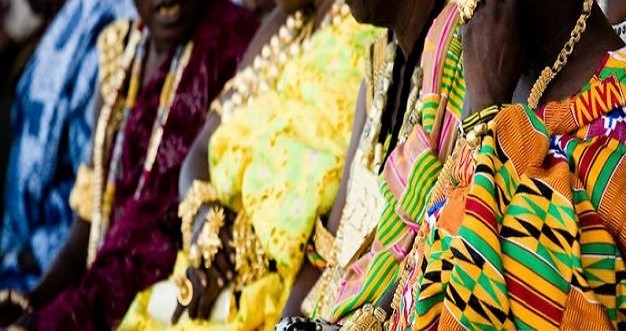The recent increased open participation of chiefs in partisan politics in gross disregard of the constitutional injunction that bars them from doing so is worrying.
It may have been argued that modern-day democratic governance, Christianity, and the desire to seek greener pastures are among other factors that have seemingly made the institution of chieftaincy quite dated and anachronistic.
But it is a truism that the institution of chieftaincy is still relevant, particularly in rural hinterlands where the tentacles of modern-day governance do not fully cover.
Other chiefs in towns and cities have maintained a certain role that has brought respect and development to their people.
Some have offered scholarships to brilliant but needy students while others have stepped in behind the scenes, in time past, to resolve political conflicts in a manner that has kept our peace and unity as a nation.
If chiefs are still relevant today, then they must be politically neutral and be measured in their partisan tones when politicians call on them during our 2020 electioneering campaign and other public fora.
When Max Weber spoke about the political neutrality of bureaucrats, he never meant they shouldn’t vote.
He meant they shouldn’t openly identify with any one political party. This must apply to chiefs too.
In the lead up to Ghana’s independence, chiefs teamed up with the intelligentsia to frustrate and almost thwart the efforts of Kwame Nkrumah.
This was why Nkrumah threatened that upon attainment of independence, he will ensure that the chiefs will run away and leave their sandals behind them.
Nkrumah carried out his threat after independence.
He personally took over the titles of the chiefs like “osagyefo”, “kantamanto” etc and under his watch, many chiefs got de-stooled.
Later on, the introduction of decentralization also worsened the plight of chiefs. No one could authorize the beating of gong-gong apart from chiefs.
But under decentralization, assembly-men and women, and district chief executives, could order people to be summoned by beating the gong-gong without recourse to chiefs.
Around the late 1980s and early 1990s, chiefs had lost their respect because of the partisan role they played in the struggle for independence.
Fortunately, the framers of the 1992 constitution were aware of the plight of our chiefs and decided to put in place provisions in the constitution to restore their respect and protect their sanctity as agents of unity, development and restraint.
Unfortunately, some chiefs have violated the ban on them from active partisan politics.
Nana Akouko Sarpong, Omanhene of Agogo Traditional area had his palace attacked and pelted with stones around 1996 for openly working with government and engaging in active partisan politics.
Other chiefs have lost their respect in the sight of politicians and their own citizens, because of their open association with political parties.
What may not be easily known to many of the Chiefs who flout the constitutional injunction is that they commit political suicide by eroding their own respect, and role as agents of unity.
They lose their role as countervailing forces and credible mediators in political impasse and conflict.
They lose their convening powers to summon their citizens for communal work and their role as agents of development as no government will work with a chief who is a known political opponent.
The days when uneducated and semi-literates were made chiefs are long gone.
Today, our chiefs are highly learned. Some are University lecturers.
Others are Lawyers, Engineers, Medical Doctors, Accountants, etc. They are very reasonable and must be called to order, to respect what the constitution say against their quest to do partisan politics.
This should be a matter of concern to those of us who are concerned with Ghana’s peace.
Indeed, this should be a matter of priority to all Ghanaians, as we seek to build a core of unbiased citizenry who will wield a certain moderating influence in intervening to help resolve conflicts when our nation threatens to implode because of partisan politics.
In other words, when politicians are fighting and formal institutions of state appear overwhelmed, chiefs, pastors, eminent statesmen etc. should be able to intervene to bring peace.
But this may not be successful once they openly pitch camp with either of the political divides.
The history of the Fourth Republic shows that power is very transient.
Therefore, chiefs who race to please politicians who call on them in their palace must know that it is in their own interest to enjoy respect from all across the divide.
They lose their own influence and respect by making open partisan remarks that place needless partisan tags on them as NPP/NDC chiefs.
Latest Stories
-
Local Government Minister proposes sanitation levy to address Ghana’s waste management crisis
6 hours -
Central University Vice Chancellor calls for Fee Voucher System to support private universities
6 hours -
Heritage Month Cooking Competition showcases Ghana’s culinary richness
6 hours -
His finest hour yet: The Bawumia concession and lessons in leadership
8 hours -
EC reschedules nomination for Nkoranza North and South District Level Elections
8 hours -
Energy Minister must recover stolen ECG containers or be held accountable – Ntim Fordjour
9 hours -
CLOGSAG suspends strike over Births and Deaths Registry appointment
9 hours -
Ing. Ludwig Annang Hesse is new president of GhIE
9 hours -
One artiste can’t take Ghana to the top, we must collaborate – Edem
9 hours -
Presidency hasn’t ordered NIB to investigate Akufo-Addo’s travels – Felix Kwakye Ofosu
9 hours -
Edem explains how 2023 motor accident made him lose gigs
9 hours -
Smoke detectors and modern technology: A game-changer in Ghana’s fight against market and home fires?
9 hours -
Provisional results for 2025 WASSCE First Series released
10 hours -
M&O Law Consult’s Emmanuel Mate-Kole awarded for ‘Excellence in Strategic Law Firm Leadership Management’
10 hours -
50 female entrepreneurs graduate from Access Bank Ghana’s Womenpreneur Pitch-A-Ton
10 hours

